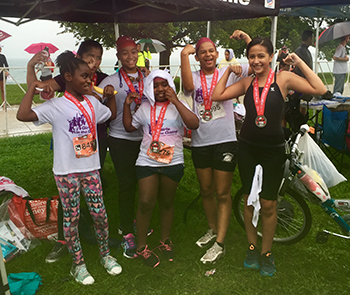Obtaining female empowerment by expanding the sports field

In the 80s, South Korea that wowed its neighbors, charging forth with exponential economic growth that took the war devastated nation to one of the most prominent economies in Asia. With corporate giants like Samsung and Hyundai on the forefronts of the global market, the small Eastern peninsula boasts a shiny, prosperous exterior that shields its misogynistic culture. When it comes to civic rights, specifically women’s rights, Korea is a country that lags far behind its fellow OECD nations. In 2015, Korea scored the largest gender wage gap among 36 member countries, falling behind Japan, Turkey, Mexico and more. This March, Korea ranked a whopping 29th out of 29 countries in the “Glass-ceiling Index” published by the British magazine The Economist. The astounding mismatch of the economic and social developments of the country impede healthy competition and further growth by suspending the female intellect. Empowering women, creating a nation where women can speak and act without fear of judgement, retribution or belittlement is crucial for the future of this country. In recognition of this issue, the Ewha Voice continues our journey in Chicago to observe Women’s Sports Chicago, where sports is used as a means to empower local women on a daily basis.
Women’s Sports Chicago, setting the ground for women ballers
In June 2006, Ewha Womans University dug up its 400M athletic track to build the massive underground Ewha Campus Complex (ECC). In replacement, the school provided a small outdoor turf, surrounded by a non-standardized track for outdoor activities. The dry rocky field is deemed too dangerous to use by a professor of the Department of Kinesiology and Sports Studies, who instead chooses to use the indoor courts for class. Even the school soccer team, the Ewha Sports Soccer Association (E.S.S.A.), plays off campus.
On the contrary, on the other side of the globe, women like Veronica McAllister are creating new venues in which local women can participate in sports. McAllister and her Co-founder Elyse Cleveland began Women’s Soccer Chicago (WSC) back in 2012, after playing co-ed soccer together for a while. During their games together, Cleveland, who played soccer professionally in college, and McAllister were both tired of being bystanders and being unnecessarily injured by the men.
“Elyse and I were playing soccer with guys who didn’t take us seriously simply because we were female,” said McAllister. “We never got the ball, and there were times when we just stepped off the field, sat on the ground, and said ‘Hey guys, I’m over here.’”
In their frustration, they decided to create a team of their own, and created a meetup for women in Chicago who wanted to play soccer.
In the years to follow, as the needs for other sports grew, WSC expanded their programs, events and pickup matches that include basketball, beach volleyball, and even running. Accordingly, they changed their name to Women’s Sports Chicago last year, to better represent their cause of empowering women through not only soccer, but a wide variety of sports, and a strong community. Their primary goal is to build a strong community that facilitates quality women’s sports internationally.
At WSC, women of all ages and backgrounds are invited to play quality sports with one another. They have various training programs, leagues, and meetups that individuals can sign up for according to their comfort level or skill, and anyone is welcome to come and play.
However, according to McAllister, the hardest part about running WSC, ironically, is bringing the women together.
“Although we have a lot of women sign up for our meetups, we first have to hold their hand through the whole process, before they even decided to join the league,” said McAllister. “Most people just don’t really know how to get into sports because guys make it feel like it’s something they are not supposed to be doing.”
In WSC’s point of view, there are plenty of women in need for their programs. The only reason why women’s sports has been kept under the dark is because no one knew how to roll it out. In the earlier stages of WSC, McAllister searched for these women, on foot, by going to play co-ed games and recruiting women on the spot.
“If the guys at the games were being really stupid on the field, I would go up to a girl and say ‘you don’t have to stand for this,’ and ‘you should come play in the women’s league,’” she shared.
For McAllister, making women feel strong and making them feel powerful through sports is the number one priority.
“Women have our own abilities, and we have our own playing style,” she advocated. “It’s very important that we make women realize that their style of play is to be valued.”

